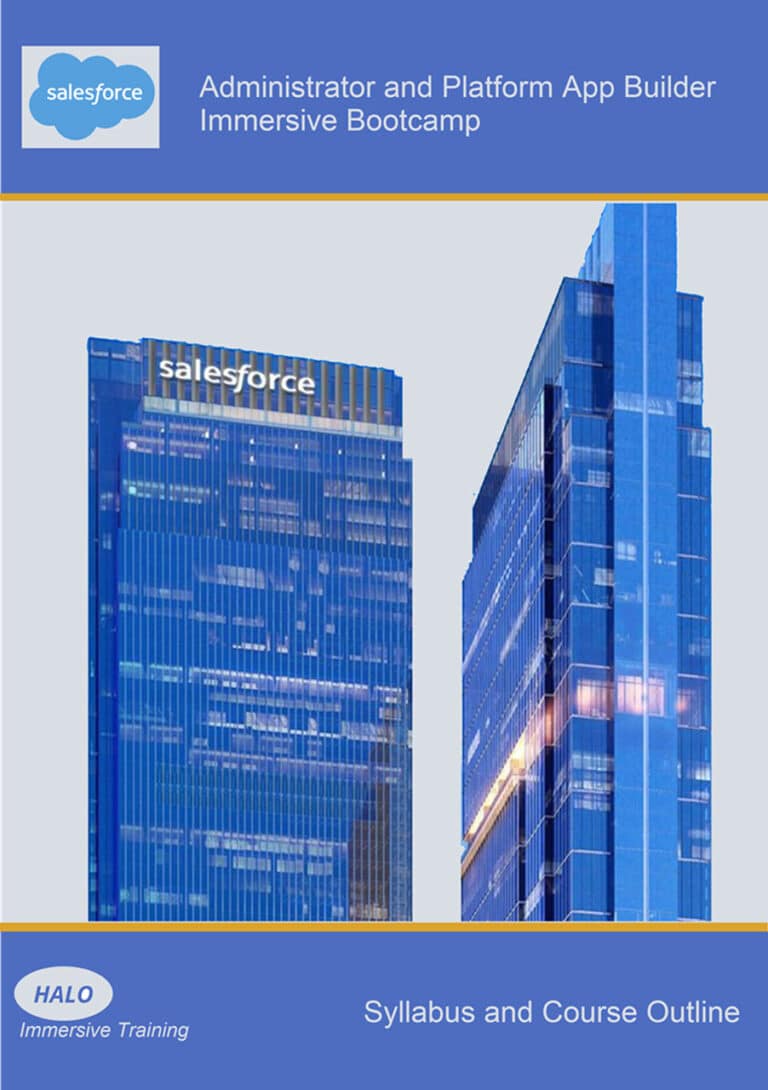HALO-101: Salesforce.com Weekend Bootcamp
Cost: $2999.99
Hours: 48
Days: 12
Weekly Saturday and Sunday classes
Scheduled Start Time: 10:00 AM EST
Scheduled End Time: 2:00 PM EST
Office Hours begin at 4:PM EST on Sundays
The Salesforce Certified Administrator program is designed for individuals who wish to become effective Salesforce.com Administrators with a heavy emphasis on exam preparation. The course will focus on the concepts and terminology associated with the applications, features, and functions available to an end user, and the configuration and management options available to an administrator in Salesforce Classic and Salesforce Lightning Experience interfaces.
The first credential that an aspiring Administrator should complete is the Salesforce Certified Administrator certification. This credential focuses on the features and functionality used to maintain a working Salesforce.com implementation.
The Salesforce Certified Administrator exam has the following characteristics:
Content: 60 multiple-choice/multiple-select questions*
Time allotted to complete the exam: 90 minutes
Passing score: 65%
Registration fee: USD 200; Retake fee: USD 100
Delivery options: Proctored exam delivered onsite at a testing center or in an online proctored environment. Click here for information on scheduling an exam.
References: No hard-copy or online materials may be referenced during the exam. Prerequisite: None required; course attendance highly recommended
The course material covers the following topics with an emphasis on passing the Salesforce.com Certified Admin Exam:
Organization Setup
Concepts and terminology as related to the Company Profile: Fiscal Year, Business Hours, Currency Management, Default Settings and Company Information
User Setup
Concepts and Terminology as it relates to User Setup and/or maintain a user (e.g., assign licenses, reset passwords, and resolve locked user accounts). Troubleshooting common user access and visibility issues.
Global User Interface
Concepts and Terminology as it relates to Global User Interface: Distinguish between the various UI features, UI settings, search settings, list views, home page layouts.
Security and Access
Concepts and Terminology as it relates to Security and Access: Org Wide Defaults, Role Hierarchy, Profiles, Permission Sets, Sharing Rules, Account Teams, Default Account Teams, Opportunity Teams, Case Teams, Manual Sharing, Field Level Security.
Standard and Custom Objects
Concepts and Terminology as it relates to Standard and custom objects and their Architecture: the standard object architecture and relationship model, Lookup relationships, Master-Detail relationships, standard fields, custom fields, page layouts and list views, Record Types, Business Processes, implications of deleting fields, formula fields.
Sales and Marketing Applications
Concepts and Terminology as it relates to Sales and Marketing Applications: Identify the capabilities and implications of the sales process, big deal alerts, update reminders, similar opportunities, competitors, team selling, products and price books, lead management, queues, assignment rules, web-to-lead, auto response rules, lead conversion, lead mapping, lead source, campaigns, campaign members, campaign influences, campaign hierarchies.
Service and Support Applications
Concepts and Terminology as it relates to Service and Support Applications: case management, case processes, case cettings, case comments, case assignment rules, case auto response rules, case escalation rules, web-to-case, email-to-case, solutions management, solutions settings, cataegories, processes, communities applications, ideas, answers, knowledge.
Activities Management
Concepts and terminology as it relates to Activities in SFDC. Identify and conceptually understand tasks, events, logging calls, sending email, cloud scheduler, Public Calenders, multi-person events.
Chatter
Concepts and terminology they relate to SFDC. This course covers the chatter feed, groups, following, security, working from the feed, collaborating effectively.
Data Management
Concepts and terminology as they relate to SFDC. Identify and conceptually understand the Import Wizard, Mass Transfer, Mass Delete, CSV files, field matching, matching types, record IDs, duplicate records, weekly data export service, exports.
Content and Folder Management
Concepts and Terminology they relate to SFDC: The course covers presentation assembly, content delivery, content packs, workspaces, and tags, communication templates, dashboards, reports, and documents.
Analytics, Reports and Dashboards
Concepts and terminology as they relate to SFDC. This course covers report types, custom report types, report format, fields, summarizing data, filtering data, charting, scheduling, and conditional highlighting, dashboard components, data sources, chart types, scheduling, and running user.
Workflow Automation/Approval Processes
Concepts and terminology as they relate to Workflow Automation in SFDC. This course covers Rule criteria, evaluation criteria, workflow actions, time-dependent workflow, time-dependent workflow actions, email alerts, workflow tasks, workflow record update, workflow outbound messages.
Lightning Process Builder/Visual Workflow
Concepts and terminology as they relate to the Lightning process builder to write complex business processes and automation using the Lightning Process Builder and Visual Workflow without code.
Salesforce.com App Builder
Use Lightning App Builder to design unique and specific user interfaces. Create Home, Record, and Navigation pages using the Lightning Platform App Builder
Desktop and Mobile Administration
Concepts and Terminology as they relate to Mobile Administration in SFDC. This course covers Salesforce Mobile App, Salesforce Mobile App, user interface, customization, and administration.
App Exchange
Identify use cases for AppExchange applications
Project/Case Study
Halo Power is a Manufacturer of large scale industrial generators. The organization is currently using the Force.com Platform for it’s standard line of natural gas, diesel fuel and propane products and services. In the near future, Halo Power plans on introducing their newly designed renewable energy products and services. This project will be laid out and documented in real time as we move through the course. Every student will turn in a documented solution using the Force.com platform. In this course, the entire class is a project and the outcome is a usable app in Salesforce.com Classic, Mobile and Lightning experience user interfaces.


